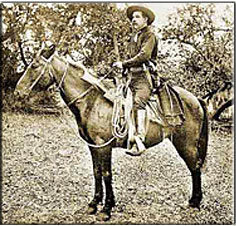Ira Aten
1862 - 1953

Ira Aten, Texas Ranger
Ira Aten was born on 3 September 1862 in Illinois. Aten's father, Austin Aten, a Methodist minister circuit rider, moved the family to Texas in 1876, settling near Round Rock. In 1878 Ira witnessed the death of outlaw Sam Bass. Listening to the Texas Rangers present, young Aten decided to become a lawman.
Aten joined the Texas Rangers in March 1883. He became a member of Company D under Capt. L. P Seiker and later served as Sergeant under Frank Jones. He served as a Regular Ranger for over six years and then as a Special Ranger (volunteering without pay) until 1891. Most of his work was in the counties bordering the Rio Grande, roughly from Pecos to Rio Grande City.
While Aten was involved in many cases, he is probably best known for his involvement in what has become known as the "Fence-Cutting Wars." When barbed wire was first introduced on the range, many people took exception to the fact that what was once free-range was now fenced, and began cutting fences, especially on the larger ranches. In some cases, these fence cutters resorted to violence and sometimes murder. Beginning in 1886 Aten was assigned to help track down and capture fence cutters. Often working under cover as ranch hands, Aten and his partners would investigate the fence cutting and had a great effect on reducing the amount of damage being done. In 1888 Aten placed dynamite bombs along some of the fences that had been cut several times. According to his memoirs: "I fixed the bombs so that when the fence was cut between the posts it would jerk a small wire laid under the grass to the cap and explode the bombs."
The Adjutant General did not approve of this method and ordered Aten to remove the bombs. Instead, Aten exploded several. Even though no more bombs were present, word spread that the bombs were planted on all of the fences in Navarro County, effectively stopping the fence cutters in that area. His Ranger activity in Fort Bend County during the Jaybird-Woodpecker War caught the attention of the leading citizens of the area and he was appointed sheriff of Fort Bend County.
By December of 1890, he was living in Castro County. In 1893 he was appointed sheriff in Castro County. In 1895 Aten was hired by the Capitol Syndicate Company to help stop cattle rustlers on the XIT Ranch. He created a ranch police force of twenty cowboys, enlisting the aid of two other former Rangers, Ed Connell and Wood Saunders.
In 1904, Aten moved his family to the Imperial Valley of California. In 1923 Ira Aten was elected to the Imperial Valley District board, a body that helped push through the legislation which authorized the building of Boulder Dam and the All-American Canal to bring water to southern California. He remained active in community organizations all of his life. In 1945 Aten's Memoirs were published by J. Marvin Hunter in his magazine, Frontier Times. Ira Aten died of pneumonia at the age of 91 on 5 August 1953. He is buried in the Evergreen Cemetery in El Centro, California.
Suggestions for further reading:
- Ira Aten, Six and one-half years in Ranger Service, 1945
- Harold Preece, Lone Star Man, New York, 1960
- Walter Prescott Webb, The Texas Rangers, Boston, 1935
- Fred Wilkins, The Law comes to Texas, Austin, 1999
- Bob Alexander, Rawhide Ranger, Ira Aten: Enforcing Law on the Texas Frontier, Denton, 2012
- Darren L. Ivey, The Ranger Ideal Volume 2: Texas Rangers in the Hall of Fame, 1874 – 1930, Denton, 2018
- Adjutant General's Service Records, Texas State Archives, Austin, Texas
- Vertical Files, Texas Ranger Research Center, Texas Ranger Hall of Fame and Museum, Waco, Texas
